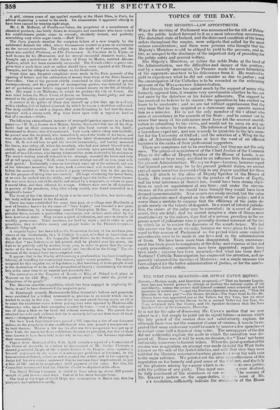TOPICS OF THE DAY.
THE MINISTRY—LAW APPOINTMENTS.
WHEN the meeting of Parliament was announced for the 5th of Febra. ary, the public looked forward to it as a most interesting occurrence. The disturbed state of Ireland, and the distressed condition of the lower orders throughout the empire, were subjects that called for the most serious consideration ; and there were persons who thought that his Majesty's Ministers would be obliged to yield to the pressure, and retire, as unequal to the discharge of the important duty of providing for the public safety and general welfare. His Majesty's Ministers, or rather the noble Duke at the head of the Administration, saw the difficulties and danger of this position • and by a masterly movement, the Premier made the most formidable' of his opponents assistant to his deliverance from it. He resolved to yield to expediency what he did not consider as due to justice ; and the emancipation of the Catholics is to be recorded as the redeeming measure of the WE LL1NGTON Administration.
But though his Grace has gained much by the support of many who formerly opposed him, it remains very questionable whether he has not lost more by tile defection of his former adherents. The support he has received we believe to be sincere ; the opposition he has excited we know to be inveterate ; and we are not without apprehension that the very fame that he has acquired as a statesman may operate against him as a minister. He is not the only member of the t. abinet who aims at ascendancy in the councils of the Slate; and he cannot but be aware that many of his colleagues must have felt the severest mollification in submitting to his views, and would not be sorry on any opportunity to return to their own. The infusion of Whiggism is at least a hazardous expelent, and can scarcely be palatable to the late member for the University of Oxfold ; and the selection of a Whig for the office of Attorney-General implies at least the want of an efficient barrister in the ranks of their professional supporters.
These are symptoms not to be overlooked; but they are not the only ones. The proposed appointment of the Chief Justice of the Common Pleas to the office of Deputy Speaker of the House of Lords, is generally. and we hope truly, ascribed to an influence little favourableto the present Administration. We ssy we hope—because, however equal that learned person may be to his. present judicial duties, we cannot prevail upon ourselves to consider him in any degree qualified for those which will attach to the office of Deputy Speaker of the House of Lords. His want of experience in the practice of Courts of Equity, and his total ignorance of Scotch law, would have been strong objections to such an appointment at any tune; and under the circumstances of the present we should have thought they would have been deemed insurmountable. New courts are easily erected, but the value of the judicature must depend on the efficiency.of the judge ; and it is worse than a mistake to suppose that the efficiency of the judge depends merely on the talents of despatch. In a court of inferior jurisdiction, the errors of the judge may be corrected ; in a court of dernier resort, they are fatal ; and we cannot imagine a state of things mom unsatisfactory to the suitors, than that of a person presiding in the supreme court of judicature who is generally deemed ignorant of the law by which he is to review the decisions of the courts below. We feel this occurr.nce the more strongly, because we were given to look forward to this session of Parliament as the penod when some valuable amendments were to be made in our laws and in the administration of them. We have been more than disappointed. Every encouragement has been given to complaints of the delay and expense of law and equity proceedings ; committees. have been appointed; reports have been made ; expense has been mcurred,—but what has been done? Nothing! Catholic Emancipation has engrossed the attention, and apparently exhausted the faculties of Ministers : nota single measure has been adopted for the better administration of justice, or for the amelioration of the lower orders.


















 Previous page
Previous page